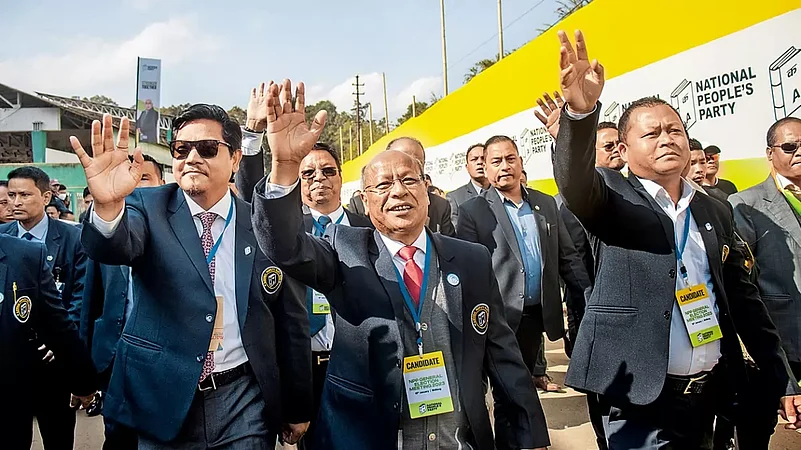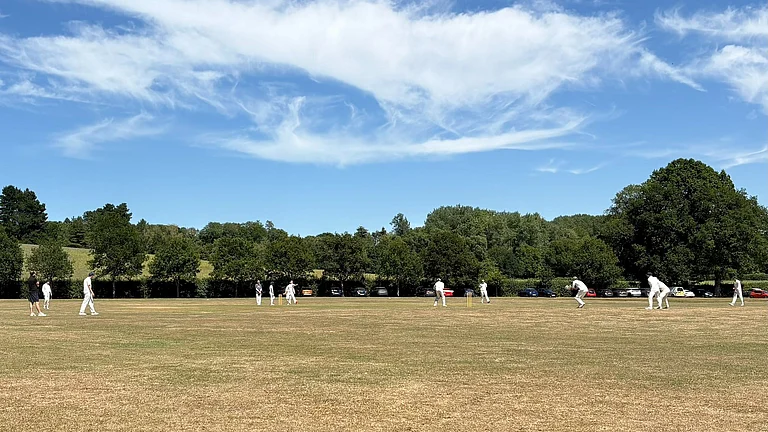The year was 2013. Purno Agitok Sangma (PA Sangma), who began his political career from the picturesque Tura district in the West Garo Hills in Meghalaya and rose to the highest position in the Lok Sabha as its speaker, founded the National People’s Party (NPP). The same year, in the Meghalaya Assembly elections, the NPP won only two seats. However, over the years, the party has rewritten the political script in Meghalaya. Today, Sangma’s son, Conrad Sangma, is the chief minister, heading a coalition government.
For years, it has been Sangma versus Sangma faction in Meghalaya. The other Sangma is Dr Mukul Sangma, who was the chief minister of the state from 2010 to 2018. He is currently the leader of the opposition in the Meghalaya Legislative Assembly.
In the upcoming elections, the highlight of the pre-poll battle is one faction of the Sangma family taking on the other. Recently, while filing his nominations from Garo Hills, the leader of opposition, Mukul Sangma, lashed out at chief minister Conrad Sangma’s NPP for ‘bowing down’ before Assam, while attempting to settle the five decade-long border disputes with the neighbouring state.
The domination of two Sangma families has left little space for other political aspirants. While people in Meghalaya have been voting for one Sangma or the other in the last two elections, they are not too happy about the fact that two politically powerful factions are practically in charge. But are they willing to give a non-Sangma a chance? Also, too many Sangmas from both factions are fighting in the upcoming elections. In such a scenario, people are looking at the Trinamool Congress (TMC) and hoping it would help shift the power dynamics to some extent. But the TMC’s decision to give candidature to four family members of Mukul Sangma raises the question—would the TMC emerge as a challenge to the domination of the family politics in Garo Hills?
Born in 1947 in the picturesque West Garo Hills, PA Sangma was a man of many talents. Before joining politics, he was a lecturer, a lawyer and a journalist. In 1999, when he left the Congress and formed the Nationalist Congress Party (NCP) along with Sharad Pawar and Tariq Anwar, it gave an opportunity to Dr Mukul Sangma, a first-generation politician from Sangma’s home turf in Garo Hills, to nurture a political dynasty of his own.

Mukul Sangma took no time to include all his family members in politics. At present, three of his family members, including his wife, Dikkanchi Shira, brother, Zenith Sangma, and his daughter, Miani Shira, are incumbent legislators in the Meghalaya legislative assembly. In November 2021, all of them joined the TMC, wiping out the Congress in one fell swoop. As a result, despite not winning a single seat in the 2018 polls, the TMC became the main opposition party in Meghalaya. This time, Dr Mukul Sangma is contesting from Songsak (East Garo Hills) and Tikrkilla (West Garo Hills), his wife from Mahendraganj (South West Garo Hills), his brother, Zenith Sangma, from Rangsakona (West Garo Hills) and his brother’s wife, Sadhiarani Sangma, from Gambegre (West Garo Hills).
The NPP, on the other hand, has given tickets to at least eight members and relatives belonging to the family of its chief, Conrad Sangma. He is contesting from the South Tura constituency, while his brother, James Sangma, is contesting from the Dadenggre seat in West Garo Hills. Conrad’s uncle, Thomas Sangma, is a contestant from North Tura and his brother- in-law, Sanjay Sangma, is contesting from Mahendraganj constituency of South West Garo Hill. Boston Marak, who is the cousin of the incumbent chief minister, is contesting from the Salmanpara Assembly constituency on a BJP ticket. Interestingly, Sangma’s another cousin Gamrik Sangma is also contesting from Salmanpara on a Congress ticket. While another cousin of Conrad, Ian Botham Sangma, is a candidate from the same constituency on an NPP ticket, Chireng Peter Marak, the brother-in-law of his sister, Agatha Sangma, is contesting on a Congress ticket from the Kharkutta constituency in the North Garo Hills district.
Sangmas are not the only ones. The Khasi and West Jaintia Hills are also dominated by political families. One such family is the family of Peter Marbaniang, a former Congress legislator and a Lok Sabha MP. The NPP has given tickets to both the daughters of Marbaniang, famously known as the Lyngdoh sisters—Ampareen Lyngdoh and Dr Jasmine Lyngdoh. In the run up to the Assembly polls in 2018, Ngaitlang Dhar, a former MLA from the Umroi constituency in Ri-Bhoi district emerged as the richest contestant with family wealth worth Rs 290 crore. In the 2023 polls, at least four members of the Dhars are contesting the elections.
Dr Anup Shekhar Chakraborty, faculty at the Department of Political Science at the Netaji Institute for Asian Studies, Kolkata, feels the entry of the TMC in Meghalaya will have no impact on the political dynasties of the NPP or the Congress. Talking to Outlook, Chakraborty says: “The TMC itself is an example of dynastic politics. The first leader is Mamata Banerjee and the second leader is, again, from her family. So, there is no second person other than the Banerjees. Thus, the TMC would be showing new maps of creating dynasties. Whether you don’t hand over the dynasty directly to your son or daughter, but you could, maybe, hand it down to one of the nearest relative who is reliable.”
Criticising the trend by the NPP and the BJP of promoting family members into politics, George Clarence Nongbet, BJP General Secretary of Meghalaya, says: “We are not happy about it and the BJP does not encourage it.”
Countering this, Chakraborty says: “The BJP is always claiming to dismantle dynastic politics, especially the Congress-centred dynastic politics in the Northeast. But even the BJP is also not free from dynastic politics. But, yes, the party tries to put a limit to the number of family members entering politics. For example, if the father is a candidate, the son or the daughters don’t get to be candidates.” He adds: “Both, the TMC and the BJP, if they manage to bring candidates to power, would be creating new centres of dynasty because the Khasis, the Garos and the Jaintias have the tendency to pass it on as heirloom from one generation to the other. Former chief ministers will always try to get tickets for their children, whether they are in power or not. So, passing on dynasty as a heritage from one generation to the other has always been a norm.”
Angela Rangad, a rights activist and an independent candidate from 19 South Shillong constituency, says: “Meghalaya has created a few decades of what we refer to as dynastic politics. This practice locks out potential ‘non-dynast’ candidates from public office. We hope that people will follow democratic procedure and our country’s electoral reform as examples of hope for a better Meghalaya while casting their votes.” PA Sangma was expelled from the Congress in 1999, along with Sharad Pawar and Tariq Anwar, for raising the banner of revolt against Sonia Gandhi. After a decade, he was heard praising Gandhi’s family’s dynastic politics. “Right from Motilal Nehru, to Jawaharlal Nehru, Indira Gandhi and Rajiv Gandhi—they have that tradition. Politics is inborn in the family and that’s good for the nation,” he has said. The irony was lost on no one.
(This appeared in the print edition as "DYNASTIC Doldrums")


























